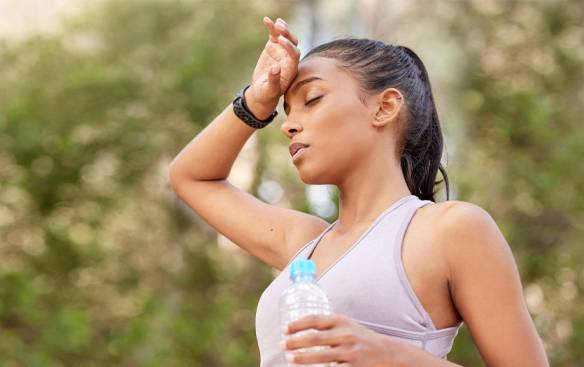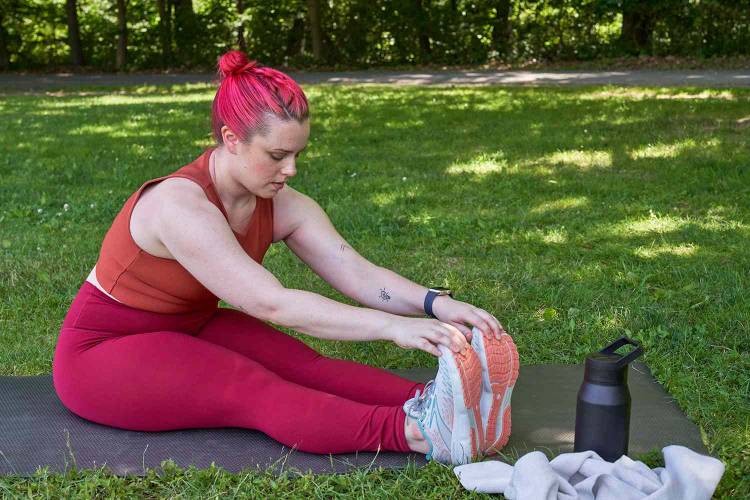
Most of us like the workout overheating running, energizing feeling that comes with exercising, but we frequently ignore the dangers of overheating, particularly during high-intensity exercises.
Even though it's normal for our body temperature to rise while we exercise, it's crucial to go by safety guidelines and recommended procedures to workout overheating running.
Recommended to read: Best Waterproof Running Shoes of 2024
Indications of Too Much Heat During Exercise

Intense physical activity or exercising in extremely hot weather are the most frequent causes of overheating, also known as hyperthermia, heat exhaustion, or heat stroke.
Recognizing the signs of hyperthermia is the first step in promptly treating it.
Symptoms of the Body Overheating
- Some common symptoms of heat exhaustion include the following:
- Headache: A pounding headache is one of the first signs that your body is struggling to regulate its temperature.
- Nausea: You could feel queasy or even puke up when your body overheats.
Exhaustion: Excessive fatigue that is out of proportion to your level of exercise may be caused by overheating. - Dizziness: You should immediately settle down and drink a lot of water if you feel lightheaded or dizzy.
- Elevated Body Temperature: A person with heat exhaustion may have a temperature of above 103°F, although feeling cool to the touch.
- Sweating: While profuse sweating is common, severe heat stroke can result in total sweating cessation, which leaves the skin feeling dry and heated.
Rapid pulse: An unusually strong or rapid pulse is another indication of hyperthermia.
Should you have any of these symptoms, you must act immediately. - For milder forms of overheating, resting in a cool environment and drinking lots of water can help bring the body temperature down and return to normal.
- However, if your symptoms are severe, get medical attention immediately workout overheating running.
Read Also: How to Increase Your Running Speed
Why Do I Get Hot While Working Out?

Understanding how your body responds to heat may help you take better precautions and stay cool when exercising.
Let's look at the root reasons of this common issue and workable fixes.
What Effects Does Exercise Have on the Body in Hot Weather?
Your body may find it difficult to tolerate heat if you have any of the following physiological factors:
Increased Blood Flow: When you exercise, your heart pumps more blood to your muscles. This increased blood flow may cause your core body temperature to rise.
Sweating: Sweating is your body's natural cooling system. However, because sweat evaporates less efficiently in excessively hot or humid temperatures, its cooling effect is workout overheating running.
Dehydration: Sweating causes fluids to be lost. Your body temperature rises when you don't drink enough water because your body can't sweat as effectively.
Body Composition: People with higher body fat percentages may overheat more rapidly because fat acts as an insulator and makes it harder for the body to release heat.
Acclimatization: If you're not used to exercising in the heat, your body might not be as good at cooling itself. Higher temperatures can ultimately be tolerated by your body, but it will take time and gradual exposure.
You May Also Like: What Are the Best Running Shoes for Men?
How Can I Reduce My Body Temperature Following Exercise?
Preventing heat exhaustion during your workout requires preparation and smart decision-making.
The Best Ways to Prevent Heat Exhaustion While Working Out
Here are some tips to help you remain cool and safe:
- To keep hydrated, drink a lot of water prior to, during, and after your workout. Consider drinking an electrolyte drink to replace lost salts after extended activity.
- Choose the Right Clothes: In hot, humid weather, especially, wear light, breathable clothing to allow sweat to swiftly evaporate. Avoid dark colors that absorb heat.
- Exercise in cooler weather: Avoid running and other physically demanding exercises in the sun, especially during the day. Early morning or late night workouts may be much more enjoyable.
- Take breaks and avoid overworking oneself. Rest frequently in a cool area, such as the shade, to allow your body to recuperate.
- Be Aware of Your Body: Pay attention to how you feel. If you start to notice the symptoms of overheating, stop exercising, relax, and drink lots of water.
- Use Cooling Techniques: After working out, take a cold bath or shower to lower body temperature. Apply damp towels or ice packs to your neck, armpits, and groin to quickly cool down.
- Avoid alcohol and coffee since they can cause dehydration and disrupt your body's natural temperature regulation.
- Large meals may raise your body temperature, so eat sparingly. Pick lighter, cooler foods like fruits and salads, which also keep you hydrated.
Quick Cool-Down Methods

Despite your best efforts, you could occasionally feel overheated after working out. Here are several methods for workout overheating running:
Cool Bath or Shower: Immersing yourself in cold water can quickly reduce body temperature.
Drink electrolyte-rich drinks to help replenish electrolytes lost via sweat, which aids in controlling body temperature.
Rest in a Cool Place: Find a cool room or a shady spot to sit and rest until you feel better.
Apply Ice Packs: Your wrists, neck, and temples are all considered pulse spots, so place ice packs there for a rapid cooling effect.
Fan Yourself: Use a fan to help sweat evaporate and to better cool your skin.
Prevention is the key.
Your best defense against heat-related diseases is, of course, prevention. By being aware of the risks and symptoms of overheating, you may take proactive steps to keep yourself safe when exercising.
Talk to our fitness and physical therapy professionals right now about a workout regimen that will keep you hydrated and cool while assisting you in reaching your health goals without compromising your safety.
.


